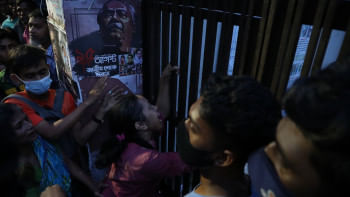Four custodial ‘suicides’ is four too many

It is an all-too familiar script. According to the police, 55-year-old Lebu Miah "took his own life" in police custody, apparently by hanging himself from the ventilator of a cell. The alleged suicide took place at the Bashtoail Police Outpost on September 26, hours after the day labourer was detained for interrogation in connection with a murder in Mirzapur upazila of Tangail. His family insist that he was tortured to death in custody and have since staged demonstrations asking for justice for Lebu Miah's death. Less than two weeks ago, police claimed that 22-year-old Rajesh Roy died by suicide in their custody in Jhalakathi. A month before that, the police alleged that 25-year-old Sumon Sheikh had killed himself in Hatirjheel Police Station – an allegation vehemently contested by his family members who had to fight an uphill battle simply to file a murder case over his suspicious death in custody. In January, 36-year-old Himangshu Roy allegedly hung himself from the window grilles of a cell at a police station in Hatibandha, Lalmonirhat.
Given the myriad creative stories we are fed every time a death takes place in the custody of law enforcement, we can't help but be wary of the police's version of events. There is no CCTV footage available to prove the police's claim that Lebu or Rajesh took their own lives. In Sumon's case, a national television channel broadcast a footage, apparently of a CCTV camera inside the lock-up, to prove that Sumon died by suicide. However, a closer look at the footage (if indeed it was even authentic) shows Sumon moving out of the frame before he allegedly took his life. In fact, the police have so far failed to provide credible CCTV footage to back up their claims of detainees suspiciously falling sick in custody or taking their own lives, which begs the question: why are police lock-ups not under surveillance given the disturbing frequency at which such incidents take place?
Even if we are to accept the police's version, that these men died by suicide, the fact remains that they died in police custody, for which the police must accept responsibility. They must launch credible investigations as to whose negligence allowed such incidents to take place on their watch, and take urgent steps to ensure that they don't happen again. Instead, what we saw in Sumon's case was an all-out attempt by the police to obstruct demands for justice, from charging protestors to sending his body for an autopsy without the family's knowledge. In Lebu's case, we are told an inquiry committee would be formed to investigate whether there was any negligence on the part of the police in his death. But given the fact that the police have rarely ever found one of their own to be guilty of a commission or omission, how confident can we be of the neutrality of such investigations?
Despite repeated calls by families of victims, civil society and international organisations including the UN, the state has categorically failed to institute a credible system through which to investigate extrajudicial killings and custodial deaths and hold law enforcement accountable. We urge the authorities to remove the blinds from their eyes and ensure that no deaths take place in police custody. Law enforcement are there to protect citizens – why should our lives be endangered in their custody?


 For all latest news, follow The Daily Star's Google News channel.
For all latest news, follow The Daily Star's Google News channel. 









Comments